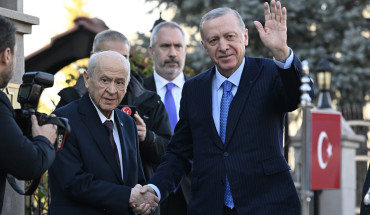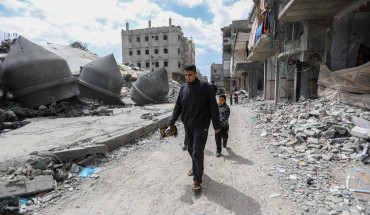A senior aide to Iran’s Supreme Leader Ali Khamenei has urged the Basij paramilitary forces to expand its presence and activities in mosques and other places of worship across the country to counter the threat of “cultural invasion.”
“The status of places of worship – not just in our era or in Muslim countries but also all around the world throughout history – has been the source of popular movements and uprisings in North African countries such as Algeria and other occupied countries,” Hojjatoleslam Tavisar-Kani, Khamenei’s representative to the Basij, said on January 25. He also quoted the Supreme Leader as saying that the presence of the “Basij resistance forces” in places of worship is significant, and called on Basij members to maintain a close relationship with mosque leaders and worshipers.
The Basij is an omnipresent force in Iran. It has active presence in mosques, government offices, industrial sector, schools and universities, cultural institutions, charity organizations, and more. Places of worship and educational institutions are particularly important for its recruitment purposes. The Basij’s official statute states that the "clergy of the neighborhoods and trusted citizens and legal associations of the neighborhoods" supervise the organization’s recruitment efforts.
Earlier this month, the new head of Basij, Brigadier General Gholamhossein Ghaib-Parvar, rejected the criticism that the paramilitary force was entering the political field. But few Iranians would agree with the assertion. The role of the Basij Force in politics increased significantly under the Mahmoud Ahmadinejad government. Basij members reportedly played a decisive role in Ahmadinejad’s reelection in 2009, by establishing campaign offices in major cities, holding rallies in the incumbent’s favor, and intimidating opposition supporters.
The Basij Force was also instrumental in the bloody suppression of anti-government protests that engulfed Iran after the 2009 controversial presidential elections. Its plainclothes agents and moral police regularly harass ordinary Iranians, university students, government workers, journalists, activists and politicians.
Now that the Basij Force is an integral part of the Islamic Revolution Guards Corps (IRGC), its security, political and economic role is expected to only grow further. On December 7, Iran’s Supreme Leader Ali Khamenei appointed Ghaib-Parvar as the new head of the Basij Force, and tasked him to counter “enemy infiltration” and “soft” threats against the regime. Previously, the Supreme Leader had warned that “enemies” were trying to change Iranians’ political beliefs and values and that “infiltrating into [political] currents is more dangerous than influencing individuals.”
Lately, the Basij has also actively recruited Iranians, Afghans and Pakistanis to fight in Syria. Last November, Major General Mohammad Hossein Bagheri, the Iranian chief of staff of the armed forces, said Basij could dispatch hundreds of thousands of fighters to Syria if supreme leader permitted. The remark showed that the IRGC intends to widen Basij’s role in regional conflicts as well. Last month, IRGC’s elite Quds Force commander, Qassem Suleimani, also said Basij forces had been instrumental in exporting Iranian revolution across the region. “Islamic movements such as Hezbollah of Lebanon and Palestinian Hamas received inspiration and spiritual aid from Basij. This is why Iran’s flag would fly in those countries,” he claimed.
The Middle East Institute (MEI) is an independent, non-partisan, non-for-profit, educational organization. It does not engage in advocacy and its scholars’ opinions are their own. MEI welcomes financial donations, but retains sole editorial control over its work and its publications reflect only the authors’ views. For a listing of MEI donors, please click here.













